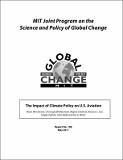The Impact of Climate Policy on U.S. Aviation
Author(s)
Winchester, Niven; Wollersheim, C.; Clewlow, R.; Jost, N.C.; Paltsev, Sergey; Reilly, John M.; Waitz, I.A.; ... Show more Show less
DownloadMITJPSPGC_Rpt198.pdf (615.9Kb)
Terms of use
Metadata
Show full item recordAbstract
We evaluate the impact of an economy-wide cap-and-trade policy on U.S. aviation taking the American Clean Energy and Security Act of 2009 (H.R.2454) as a representative example. We use an economywide model to estimate the impact of H.R. 2454 on fuel prices and economic activity, and a partial equilibrium model of the aviation industry to estimate changes in aviation carbon dioxide (CO2) emissions and operations. Between 2012 and 2050, with reference demand growth benchmarked to ICAO/GIACC (2009) forecasts, we find that aviation emissions increase by 130%. In our climate policy scenarios, emissions increase by between 97% and 122%. A key finding is that, under the core set of assumptions in our analysis, H.R. 2454 reduces average fleet efficiency, as increased air fares reduce demand and slow the introduction of new aircraft. Assumptions relating to the sensitivity of aviation demand to price changes, and the degree to which higher fuel prices stimulate advances in the fuel efficiency of new aircraft play an important role in this result.
Description
Abstract and PDF report are also available on the MIT Joint Program on the Science and Policy of Global Change website (http://globalchange.mit.edu/).
Date issued
2011-04URI
http://globalchange.mit.edu/pubs/abstract.php?publication_id=2152http://hdl.handle.net/1721.1/66296
Publisher
MIT Joint Program on the Science and Policy of Global Change
Citation
Report no. 198
Series/Report no.
;Report no. 198
The following license files are associated with this item: